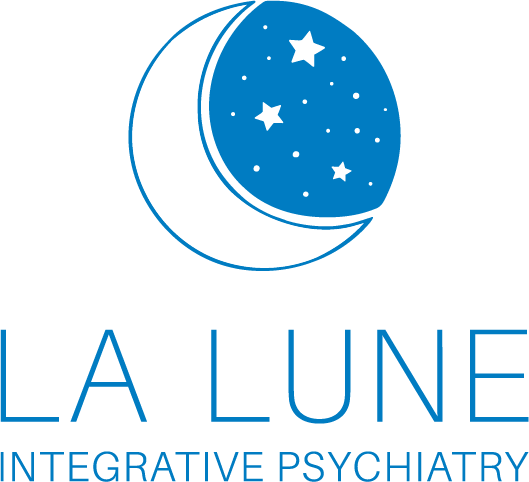How to Develop Healthy Communication in Your Relationships
By La Lune Integrative Psychiatry Updated on May 28, 2024 — Medically Reviewed by Elita Wong, Board-certified Psychiatric Nurse Practitioner
Communication is not just about exchanging words; it's about understanding and being understood. In romantic and close relationships, poor communication can have far-reaching effects, leading to misunderstandings, resentment, and feelings of isolation.
As holistic providers, we understand the profound impact that communication and relationships can have on our mental health. In our practice, we often encounter a wide array of communication challenges that can strain relationships and exacerbate conditions such as anxiety, depression, and OCD. In this blog, we'll share insights from our work and explore how improving communication skills can lead to better mental health outcomes and more mutually satisfying relationships.
What you actually need to know about healthy communication in relationships
Communication is a crucial aspect of any relationship, and how you communicate with your partner speaks to the quality and durability of your relationship. While there are many routes of talking about communication, today we’ll focus on what we believe couples actually need to hear in their quest for healthier ways to communicate and ultimately, healthier relationships.
What often gets lost in many discussions about communication are the concepts of empathy and vulnerability. The true essence of communication lies in stepping outside our ego and being willing to see and be seen by others. It's about going beyond surface level explanations and delving deep into what's truly going on with us underneath, understanding how our thoughts and emotions affect us and those around us. True, helpful communication in romantic relationships requires connecting with the part of us that knows what it’s like to experience our primary emotions (anger, fear, sadness, joy), and allowing that knowledge to fuel our understanding of what our partner is going through. This level of communication requires vulnerability, empathy, and a genuine desire to connect with others on a deeper level.
What gets in the way of healthy communication in relationships?
To begin creating healthier ways of relating to one another, it’s important to first diagnose where communication is breaking down. Is it a timing error, poor word choice, or are heated conversations a symptom of a deeper value disconnect between partners? Oftentimes, it is more than one thing leading to a couples’ communication challenges
Some common communication challenges include:
Lack of Active Listening: When one or both partners are more focused on getting their point across than truly listening to the other person, communication can break down.
Assumptions and Misinterpretations: Jumping to conclusions or interpreting the other person's words or actions based on preconceived notions can lead to misunderstandings.
Emotional Baggage: Past experiences, traumas, or unresolved issues can color the way individuals perceive and respond to communication in their current relationships.
Defensiveness: Feeling attacked or criticized can trigger defensive responses, making it difficult to have open and honest conversations.
Poor Timing: Bringing up sensitive topics or trying to have important conversations at the wrong time can lead to defensiveness or avoidance.
Lack of Empathy: Failing to consider the other person's perspective or emotions can result in communication that feels dismissive or uncaring.
Unrealistic Expectations: Expecting the other person to read your mind or always know what you need without clear communication can lead to frustration and disappointment.
Avoidance: Avoiding difficult conversations or sweeping issues under the rug can create resentment and distance in the relationship.
Communication Styles: Differences in communication styles, such as one partner being more direct while the other is more indirect, can lead to misunderstandings if not understood and accommodated.
External Stressors: Stress from external sources, such as work, family pressures, or mental health challenges, can spill over into communication within the relationship, making it harder to connect effectively.
Unmet Emotional Needs: Sometimes, unexpressed emotions like anger, hurt, or resentment can create walls between partners. By speaking openly about our feelings, we can build trust and intimacy. It's equally important to listen to our partner without judgment and offer support when they share their emotions.
Recognizing these barriers in your relationship can feel disheartening, but is an important step towards identifying communication strategies that can improve your relationship.
What Is Nonviolent Communication?
Nonviolent communication (NVC) is a positive and empathetic approach to communication based on the principles of nonviolence. Marshall Rosenberg developed this method to foster greater understanding and empathy between people. The NVC framework is simple yet effective in enabling respectful and meaningful connections with others.
What Are the Four Principles of Nonviolent Communication?
Nonviolent communication (NVC) is founded on four fundamental principles. During disagreements, both partners should apply these principles to help address the underlying issues, set boundaries, and reach a compromise. Developing NVC skills can also assist in navigating challenging conversations and prevent conflicts from escalating.
Observe without judging: Observation refers to stating the observable facts of a situation without judgment. In his book on NVC, Rosenberg goes over specific word choice and language that can make another person feel judged. For example, saying "you didn't call me back" instead of "you ignored me." The latter assumes that the person did not call back because they were intentionally trying to ignore.
Identify feelings: This step requires expressing how the situation impacted you emotionally, using "I" statements. For example, "I felt worried when I didn't hear from you."
Connect your feelings to needs: Need refers to the underlying human needs, values, or desires motivating your feelings. For example, "I need security in our relationship and reassurance that we're okay."
Make requests to meet your needs: Request refers to the concrete actions you would like taken to satisfy your needs. For example, "Would you be willing to call me back within 24 hours when I call you?"
How to Integrate Nonviolent Communication and Conflict Resolution
Integrating NVC principles into conflict resolution can transform arguments into constructive conversations, especially in intimate relationships. During disagreements, nonviolent communication skills help you identify the root cause of issues, express how specific actions impact you, and find compromise.
Here are some situations where nonviolent communication and conflict resolution skills can be highly effective:
When discussing disagreements over household chores and responsibilities, stating your feelings and needs in a non-accusatory way can help you reach a compromise that works for both partners.
When negotiating how much time to spend time together, express your desire for quality time and intimacy while acknowledging your partner's different needs. This can lead to a schedule that satisfies you both.
In parenting situations where children are misbehaving or not following household rules. Using nonviolent communication strategies like active listening and observation without judgment can get to the root of the issue and resolve conflicts more effectively.
During financial discussions, one partner may want to spend money differently. Applying the four principles by stating facts, feelings, needs, and requests can help you find common financial goals that incorporate your priorities.
Effective communication is a vital aspect of any successful relationship. By practicing nonviolent communication, you can build stronger connections with those around you.
Develop healthy communication strategies with support from La Lune Integrative Psychiatry
Individual psychotherapy offers a unique and beneficial approach to learning communication strategies. In one-on-one sessions at La Lune Integrative Psychiatry, you have the dedicated space and focus to explore your personal communication patterns, challenges, and strengths. This individualized approach allows for a deeper understanding of your communication style and can lead to more personalized strategies for improving your relationships.
Couples therapy can be incredibly beneficial for improving communication within relationships. In couples therapy, both partners have the opportunity to learn and practice new communication skills together. This collaborative approach allows for real-time feedback and support, helping couples develop healthier ways of relating to each other and resolving conflicts. We typically refer to specialists outside of our practice for family and couples therapy.
Overcoming communication barriers can be challenging, but you can achieve healthy, fulfilling dialogues with patience and empathy. With a commitment to improving your communication skills, the barriers between you and your loved ones will start to come down. Take the first step towards building stronger relationships and increasing your conflict resolution tools by booking an appointment with one of our providers today.
Disclaimer: This website does not provide medical advice and may be out of date. The information, including but not limited to text, PDFs, graphics, images, and other material contained on this website are for general educational purposes only. No material on this site is intended to be a substitute for professional medical advice, diagnosis, or treatment, and does not create a patient-doctor relationship. Always seek the advice of your qualified healthcare provider with any questions you may have regarding a medical condition, lifestyle or dietary changes, treatments, and before undertaking a new health care regimen. Never disregard professional medical advice or delay in seeking it because of something you have read on this website.




